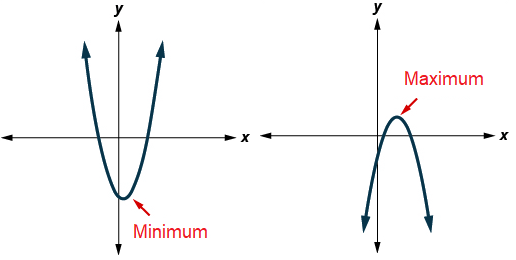MAXIMUM HEIGHT QUADRATIC WORD PROBLEMS
Subscribe to our ▶️ YouTube channel 🔴 for the latest videos, updates, and tips.
In general the graphical form of the quadratic function will the shape of u. It may be open upward or downward.
- Maximum point is the highest point of the parabolic path.
- Minimum point is the lowest point of the parabolic path.
To find maximum or minimum point of the quadratic equation we follow two ways.
(i) Converting into the vertex form
(ii) Using formula

Converting the quadratic function into vertex form :
The vertex form of a quadratic polynomial is
y = a(x - h)2 + k
Here (h, k) is vertex.
- If a > 0, then the parabola opens up.
- If a < 0, then the parabola opens down.
Using formula :
Compare the given equation with the general form of a quadratic equation
y = ax2 + bx + c
To find x-coordinate of vertex, we can use the formula
x = -b/2a
This value can be applied in the given equation to get the value of y.
Problem 1 :
An arrow is fired from a bow and its height, h, in metres above the ground, t seconds after being fired, is given by
ℎ(𝑡) = −5𝑡2 + 40𝑡 + 3
Algebraically determine the maximum height attained by the arrow and the time taken to reach this height.
Solution :
ℎ(𝑡) = −5𝑡2 + 40𝑡 + 3
Using completing the square method,
Step 1 :
Factor the coefficient of x2 from the first two terms.
= -5(𝑡2 - 8t) + 3
Step 2 :
Decompose the coefficient of t as multiple of 2
= -5[𝑡2 - 2 t (4) + 42 - 42] + 3
8t is broken into 2 x t x 4 and this is in the form of 2ab
Step 3 :
To complete this we add 42 and subtract 42
= -5[(𝑡 - 4)2 - 42] + 3
= -5[(𝑡 - 4)2 - 16] + 3
= -5(𝑡 - 4)2 + 80 + 3
= -5(𝑡 - 4)2 + 83
Maximum is at 4, the maximum value is 83.
So, the maximum height reached by the arrow is 83 meters and time taken for this is 4 seconds.
Problem 2 :
The path of a model rocket can be described by the quadratic function
𝑦 = −x2 + 12x
where 𝑦 represents the height of the rocket, in meters, at time 𝑥 seconds after takeoff. Identify the maximum height reached by the rocket and determine the time at which the rocket reached its maximum height.
Solution :
𝑦 = −x2 + 12x
𝑦 = −[x2 - 12x]
𝑦 = −[x2 - 2x(6) + 62 - 62]
𝑦 = −[(x - 6)2 - 62]
𝑦 = −(x - 6)2 + 36
vertex is at (6, 36)
Maximum height reached by the rocket is 36 meters after 6 seconds.
Problem 3 :
A baseball is hit and follows a parabolic path described by the function
ℎ(𝑡) = −3𝑡2 + 12𝑡 + 1
where 𝑡 is time in seconds after the ball is hit and ℎ(𝑡) is the height of the ball above ground in metres. Algebraically determine the maximum height reached by the ball and the time it takes the ball to reach its maximum height.
Solution :
ℎ(𝑡) = −3𝑡2 + 12𝑡 + 1
ℎ(𝑡) = −3[𝑡2 - 4𝑡] + 1
ℎ(𝑡) = −3[𝑡2 - 2𝑡(2) + 22 - 22] + 1
ℎ(𝑡) = −3[(𝑡 - 2)2 - 4] + 1
ℎ(𝑡) = −3(𝑡 - 2)2 + 12 + 1
ℎ(𝑡) = −3(𝑡 - 2)2 + 13
Vertex is at (2, 13)
The baseball will reach the maximum height after 2 seconds and the maximum height is 13 meters.
Problem 4 :
The height
ℎ = −16𝑡2 + 64𝑡 + 190
in feet of an object above the ground is given by where t is the time in seconds. Find the time it takes the object to strike the ground and find the maximum height of the object.
Solution :
ℎ = −16𝑡2 + 64𝑡 + 190
When it strikes the ground, h = 0
−16𝑡2 + 64𝑡 + 190 = 0
t = 5.98 seconds
Maximum value :
h = −16𝑡2 + 64𝑡 + 190
t = -b/2a
t = -64/2(-16) ==> 2
When t = 2, h = −16(2)2 + 64(2) + 190
h = -64+128+190
h = 254
So, the maximum height is 254 feet.
Problem 5 :
The height in feet of a bottle rocket is given by
h(t) = 160t −16t2
where t is the time in seconds. How long will it take for the rocket to return to the ground? What is the height after 2 seconds?
Solution :
h(t) = 160t −16t2
h(t) = −16t2 + 160t
When it reaches the ground, its height = 0
−16t2 + 160t = 0
-16t(t - 10) = 0
t = 0 and t = 10
After 10 seconds it will reach the ground.
h(t) = 160t −16t2
t = 2
h(2) = 160(2) −16(2)2
= 320 - 64
= 256 ft
So, the height after 2 seconds is 256 ft.
Subscribe to our ▶️ YouTube channel 🔴 for the latest videos, updates, and tips.
Recent Articles
-
Finding Range of Values Inequality Problems
May 21, 24 08:51 PM
Finding Range of Values Inequality Problems -
Solving Two Step Inequality Word Problems
May 21, 24 08:51 AM
Solving Two Step Inequality Word Problems -
Exponential Function Context and Data Modeling
May 20, 24 10:45 PM
Exponential Function Context and Data Modeling